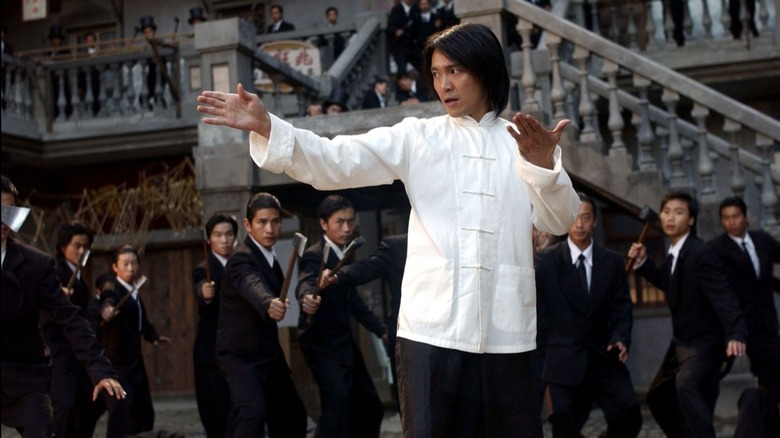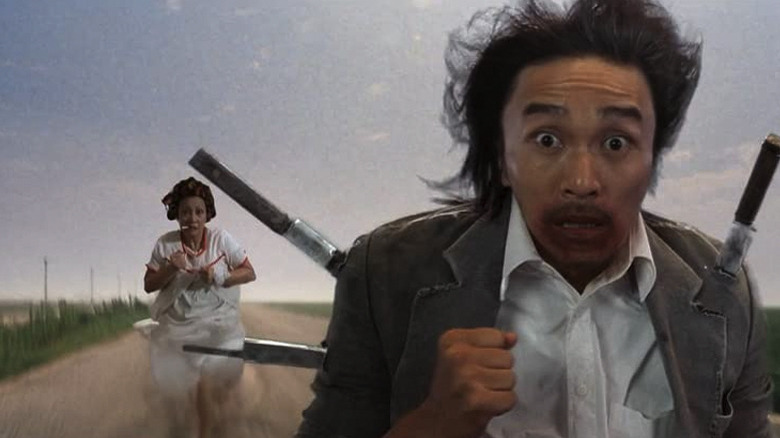The Dancing Sequence In Kung Fu Hustle Was Actually An Accident
For those who've seen it, the 2004 film "Kung Fu Hustle" exists as a truly unforgettable balancing act of both tone and genre. It tells the story of a young man named Sing (Stephen Chow), who turns his back on altruism after getting beaten up for his kindness and now aspires to join the feared Axe Gang. Questions of identity and purpose arise, however, when he naively incites conflict between his would-be brethren, the impoverished community of Pigsty Alley, and the martial arts heroes hiding within it.
"Kung Fu Hustle" borrows from a variety of inspirations and employs them in vastly unconventional ways. The result is a film that somehow manages to balance action, comedy, and heart-wrenching drama into a kind of modern Wushu legend. As director, writer, and actor, Chow achieves this equilibrium effortlessly but with intentionality. After all, the film is his emotionally sprawling love letter to the kung fu films of his youth. Yet there was one idiosyncrasy in "Kung Fu Hustle" that was indeed unintentional. It deals with one of the film's many antagonists, the ruthless Axe Gang leader Brother Sum (Danny Chan Kwok-kwan), and his unique proclivity for dancing.
The Axe Gang: Brutal murderers and talented dancers
In a 2005 interview with IGN, it came to light that Chow didn't originally plan to shoot scenes with Brother Sum dancing, which is strange; not only does Danny Chan Kwok-kwan possess fantastically expressive moves, but the scenes in which he dances are some of the villain's best moments. Chow revealed that the origins of Sum's rug cutting was a lucky chance, saying that "it was an accident to have the dancing sequence" in the film at all. He explained further:
"Because the actor who played the boss of the Axe Gang is a dancer. When I thought about how to present how tough the Axe Gang was, I took a long time to try to figure out how to make it tougher, and different from normal gangs. I saw that he danced, and I thought, 'Why not? Let's dance.' I know it sounds ridiculous to have dancing scenes to represent the toughness, but for me it makes sense, because I just tried to go another way around, like not directly describe how cruel they are, but the dancing sequence, but at the same time we intercut some [gang] incidents that they have made. And it's funny."
The film's opening scene pretty much sets the tone for the Axe Gang's brutal show of strength when Sum shimmies over, axe in hand, to execute rival Crocodile Gang leader and his mistress. The latter being his own sister doesn't earn her any mercy. Sum's graceful surety and coy movements are especially incongruent to the carnage that follows. Then there's the montage of crime scene photos depicting gory Axe Gang murders that flash between shots of Sum leading a troupe of gang members in a choreographed dance. Like Chow, it's hard for me to pinpoint exactly why the juxtaposition works, but it does, making the gang leader all the more fearsome because of it.
Kung Fu Hustle was a genre-bending phenomenon
"Kung Fu Hustle" served as Chow's follow-up to his immensely popular and must-see "Shaolin Soccer," and it incorporated aspects of the director's seasoned familiarity with the form of slapstick humor known as mo lei tau. But the homages don't end there. At any moment in "Kung Fu Hustle," you are treated to quotes from and allusions to well-known films like "The Godfather," "The Matrix Reloaded," and Sam Raimi's "Spider-Man." There are also homages to famous martial arts films like "Enter the Dragon" throughout, with Chow even casting long-retired masters like Leung Siu-lung ("Deadly Hands of Kung Fu") in central roles.
Its action sequences and the mannerisms of characters also resemble popular anime and Looney Tunes characters, whether in a cartoonish chase between Yuen Qui's landlady and Chow's Sing, or the equally ridiculous moment when Qui's character tosses her lecherous husband and fellow landlord, played by Yuen Wah, out their apartment window. But such moments of levity are slipped next to the brutality of the movie's villains, which include the Blues Brothers-inspired assassin Harpists (Gar Hong-hay and Fung Hak-on) and their defeat of Pigsty Alley's trio of instantly beloved heroes: Coolie (Xing Yu), the Tailor (Chiu Chi-ling), and Donut the baker (Dong Zhihua).
There's a reason Bill Murray, a comedy legend in his own right, once referred to "Kung Fu Hustle" as the "supreme achievement of the modern age in terms of comedy," and why it appeared on director James Gunn's list of favorite action films. But I'd amend his review only slightly to acknowledge the number of tears that are present in this gem of a story. If you're looking for a movie to scratch that special itch of stunning martial arts and a heart-warming tale, the kind I found myself needing after watching the similarly genre-bending "Everything Everywhere All At Once," Chow's film is it.

